Can Criminal Mischief Be Dropped if You Are a First-Time Offender?
Yes, if it’s a summary offense. Otherwise, you may just receive a probation sentence.
 Written by Background Check Repair
Written by Background Check Repair
Criminal Records | April 29, 2024
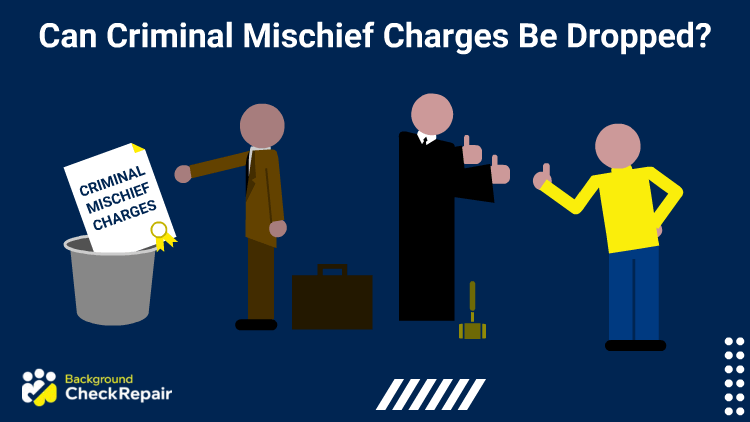
Table of Contents
Can criminal mischief charges be dropped?
When facing a potential criminal mischief charge, the first thing anyone should do is check to see if the charges can be dropped and run a background check on themselves to ensure that no record of the charges remain.
Most criminal mischief results from pranks gone wrong and is defined as causing damage or defacing someone’s property through negligent, reckless, or intentional actions.
When convicted, criminal mischief charges go on a person’s criminal record, which may be hindrances to their future employment prospects. But, it is possible to get the charges dropped.
The following guide explains when criminal mischief be dropped, and outline how to check criminal records completely, so that you can know your record is clean.
Criminal mischief is a giant term relating to offenses that involve property belonging to someone else. Criminal mischief is similar to damage to property, vandalism, or malicious mischief, depending on the state.1
The amount of damage and the intent of the charge determines its severity. Criminal mischief can be defined in the following ways:4
Criminal mischief has several degrees depending on the extent of the harm. The more serious degrees will be awarded much higher consequences.
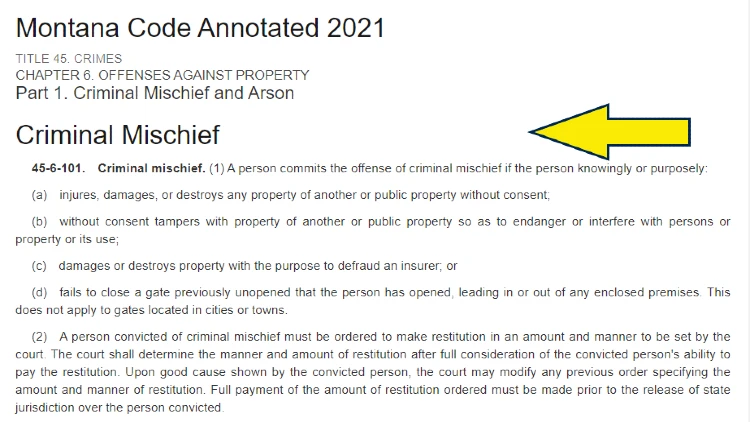
Criminal mischief charges are categorized differently in every state, and are usually dictated by the monetary amount of damage caused.
Criminal mischief examples include criminal mischief misdemeanors and criminal mischief felonies.
Criminal mischief examples include:
In Florida, if the property’s value is less than $1000, the criminal mischief will be considered a first or second-degree misdemeanor. The convicted person might face the following consequences:
It is important to note that criminal mischief misdemeanor convictions vary from state to state. For example, criminal mischief misdemeanor in Pennsylvania is categorized as a misdemeanor charge or a summary offense.
In Florida, if the property is more than $1000, then the criminal mischief will be categorized as a third-degree felony charge which will incur a jail term of close to five years.
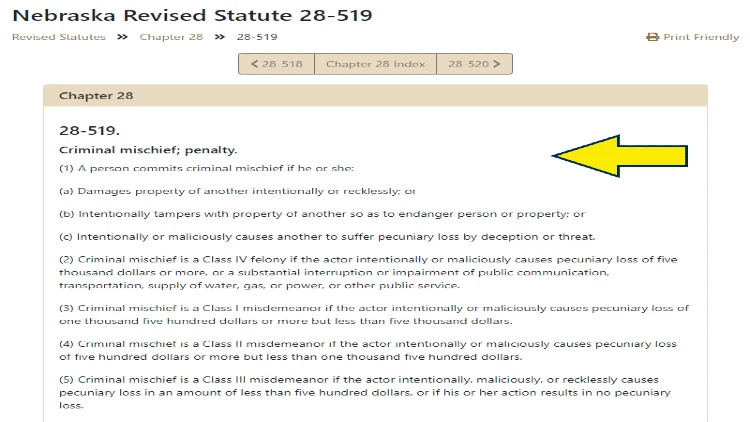
The penalties for criminal mischief charges also vary from state to state, but can be accessed by searching for the information in the state legal library.
Criminal mischief felony convictions vary from state to state; for example, in Pennsylvania, a third-degree felony conviction is punishable by up to $15,000 in fines and a seven-year prison sentence.
Proving criminal mischief depends on the amount of damage done and the exact intent, which is subjective. Therefore, there are several possible defenses to being charged with criminal mischief.
It’s important to note that an arrest is not a conviction. The prosecutor has to prove the criminal mischief charge. For a conviction to occur, the prosecutor must categorically prove that:
The main cost in criminal mischief cases is paying restitution. Here, the defendant can argue the damaged property’s value to reduce the charges. For example, a misdemeanor can be reduced to a summary offense in Pennsylvania.
According to the Montana Code criminal mischief has a standard fine of no more than $1500, a jail term, and restitution.5
Can criminal mischief charges be dropped? Yes, if the defendant provides proof against the allegations. The most common ways to defend against criminal mischief include but are not limited to the following:
Lack of intent: here, the defendant proves that the damage was accidental rather than willfully or malicious. It’s important to note that if this defense is successful, the defendant will still have civil liability for the damage caused.
The defendant did not commit the crime: in this case, someone else may have caused the damage, or the defendant was just a passerby. The prosecution has to prove beyond reasonable doubt that the defendant damaged the property, and there are many ways to navigate this.
Reduce the financial damage value: if the prosecution can’t prove the loss, then the defendant can lower the charge to a summary offense or make it law enough so that it wasn’t a crime at all.
A few other long-shot defenses include:
Vandalism and other forms of criminal mischief can incur very severe penalties. Anyone accused of criminal mischief should take it seriously, as it can result in a criminal record, suspended license, or jail time.
The punishment depends on the type of charge. Criminal mischief misdemeanors and felonies will definitely stay on your record.
In most states, if a person has been charged with criminal mischief misdemeanor, then the sentence could be probation, a fine, or a short jail term. On the other hand, if they are charged with criminal mischief felony, they are likely to be sentenced to several years in prison. Both cases will also include restitution for the damaged property.
Restitution means paying for the financial harm caused by criminal mischief. The prosecution will calculate the amount of loss while, at the same time, proving beyond reasonable doubt that the defendant caused the loss.
The amount of loss is calculated the same way as damage in a car accident. The victim whose property was destroyed will be awarded repair costs. In a case where the guilty party damaged the item beyond repair, or the repairing cost exceeds the item’s value, the victims are entitled to receive the item’s worth before the criminal mischief occurred.
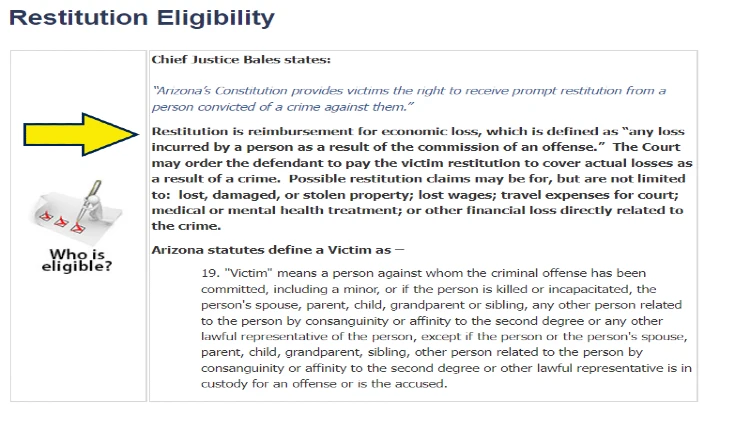
Some states provide restitution options for anyone wondering can criminal mischief charges be dropped if you pay for the damage.
If the mischief did not result in a total loss, then the victim is not entitled to get the item’s current full value. The determination of repair costs is often left to appropriate repair professionals. Sometimes, if the destruction only involves a part of a larger item, the repair cost will be an estimate of the price of the replacement part.
Additionally, the current value of the damaged property can be obtained by examining the price in the market of other similar items or insurance claim guidelines. The battle in court will involve the prosecution showing evidence of the amount of loss while the defense showing evidence that supports a lower loss amount.
In Pennsylvania, criminal mischief is categorized into multiple degrees depending on the amount of harm caused according to the Title 18 – PA General Assembly.6 These degrees include:
Summary offense refers to criminal mischief that accrues less loss than a misdemeanor. Usually, the penalty is a $300 fine and a 90-day jail term. In this case, the criminal mischief charge can be dropped completely and will not appear on the offender’s record.
Just like Pennsylvania, New York has multiple degrees of criminal mischief, including:
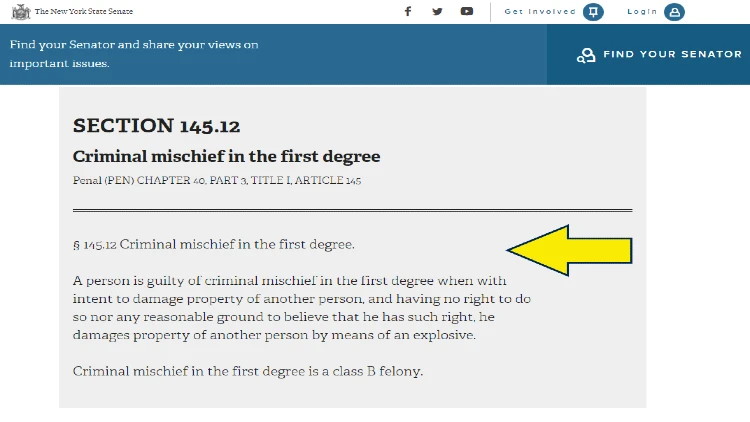
Criminal mischief in the first degree in New York is a class B felony charge.
Criminal mischief charges cannot be dropped in New York once the cases have been filed and there is enough proof. The offender can only opt for alternative programs that prevent the charges from getting into their criminal records.
Statutes of limitations refer to the time limits the prosecutors have for filing criminal charges. The severity of the crime determines the time limits. Very severe crimes, such as violent crimes (capital murder, etc.), do not have statutes of limitations.
Criminal mischief charges that fall under felonies or misdemeanors have statutes of limitations that vary from state to state. For instance, in New York, the statute of limitations for most felonies is five years.
In comparison, misdemeanors and petty offenses have two years and one-year statute of limitation periods, respectively. Therefore, since most criminal mischief charges fall under felonies in the state, the general statute of limitation is five years.
The first step in setting your record straight is to learn how to conduct a self-background check. A second-tier background investigation will reveal specific details of a person’s criminal history, including outstanding charges. Most states allow for criminal records to be sealed or expunged.
Criminal mischief charges can be dropped through a pre-trial diversion.
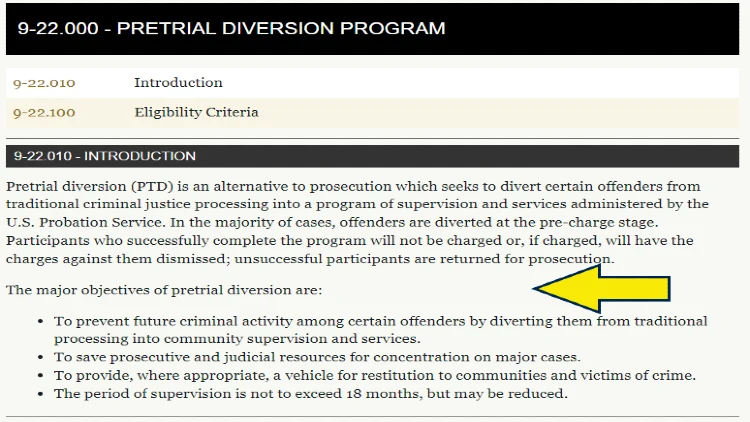
Pretrial diversion programs can help get criminal mischief charges dropped, and is especially used for first time offenders.
The mischief charges may be dropped if the defendant chooses one of several pre-trial diversion options, such as alternative measures programs and mental health diversion.
Suppose this is the offender’s first or second crime with no more than two charges within two years, and the criminal mischief was relatively modest. In that case, the alternative measures program might be a successful option for them.2
If the accused is not offered a pre-trial diversion option, additional sentencing options are available, some of which may even allow one to avoid a criminal record. For instance, a person may be a strong candidate for discharge depending on the specifics of the criminal act and their circumstances at the time of the offense. Following a mischief conviction, one may apply for one of two discharges:
One will be permanently absolved of their offense if they successfully comply with the terms for the time frame that they are established. It should be noted that one can only apply for a discharge after pleading guilty or being proven guilty of the offense.
An absolute discharge will only appear for one year on criminal record checks, as opposed to a conditional discharge, which typically appears for three years and can negatively impact a person’s ability to travel and find work.
| Can Criminal Mischief Charges Be Dropped in All Fifty States? | Number of Criminal Mischief Arrests |
| Can Criminal Mischief Charges Be Dropped in Alabama? | Yes. There were 653 arrests for vandalism in AL. Property damage over $1000 results in a felony. |
| Can Criminal Mischief Charges Be Dropped in Alaska? | Yes. There were 323 arrests for vandalism in AK. Property damage over $750 result in a felony. |
| Can Criminal Mischief Charges Be Dropped in Arizona? | Yes. There were 3,285 arrests for vandalism in AZ. Property damage over $1000 results in a felony. |
| Can Criminal Mischief Charges Be Dropped in Arkansas? | Yes. There were 1,685 arrests for vandalism in AR. If the property is valued at more than $500, the crime is charged as a felony. |
| Can Criminal Mischief Charges Be Dropped in California? | Yes. There were 1,354 arrests for vandalism in CA. The charge can be a felony if the property damage is over $400. |
| Can Criminal Mischief Charges Be Dropped in Colorado? | Yes. There were 5,467 arrests for vandalism in CO. Property damage over $1000 results in a felony. |
| Can Criminal Mischief Charges Be Dropped in Connecticut? | Yes. There were 1,600 arrests for vandalism in CT. Property damage over $1500 results in a felony. |
| Can Criminal Mischief Charges Be Dropped in Delaware? | Yes. There were 873 arrests for vandalism in DE. Property damage over $1500 results in a felony. |
| Can Criminal Mischief Charges Be Dropped in Florida? | Yes. There were 13 arrests for vandalism in FL. Property damage over $1000 results in a felony. |
| Can Criminal Mischief Charges Be Dropped in Georgia? | Yes. There were 3,449 arrests for vandalism in GA. The charge can be a felony if the property damage is over $500. |
| Can Criminal Mischief Charges Be Dropped in Hawaii? | Yes. There were 83 arrests for vandalism in HI. Property damage over $1000 results in a felony. |
| Can Criminal Mischief Charges Be Dropped in Idaho? | Yes. There were 709 arrests for vandalism in ID. Property damage over $1000 results in a felony. |
| Can Criminal Mischief Charges Be Dropped in Illinois? | Yes. There were 1,649 arrests for vandalism in IL. The charge can be a felony if the property damage is over $300. |
| Can Criminal Mischief Charges Be Dropped in Indiana? | Yes. There were 564 arrests for vandalism in IN. Property damage is at least $50,000 results in a felony |
| Can Criminal Mischief Charges Be Dropped in Iowa? | Yes. There were 1,951 arrests for vandalism in IA. Property damage over $1500 results in a felony. |
| Can Criminal Mischief Charges Be Dropped in Kansas? | Yes. There were 1,593 arrests for vandalism in KS. Property damage over $1000 results in a felony. |
| Can Criminal Mischief Charges Be Dropped in Kentucky? | Yes. There were 1,302 arrests for vandalism in KY. Property damage over $1000 results in a felony. |
| Can Criminal Mischief Charges Be Dropped in Louisiana? | Yes. There were 2,299 arrests for vandalism in LA. Simple criminal damage to property is a felony if the property damage is $500 or more. |
| Can Criminal Mischief Charges Be Dropped in Maine? | Yes. There were 948 arrests for vandalism in ME. The charge can be a felony if the property damage is over $2000. |
| Can Criminal Mischief Charges Be Dropped in Maryland? | Yes. There were 532 arrests for vandalism in MD. Damage to property is a misdemeanor offense in MD. |
| Can Criminal Mischief Charges Be Dropped in Massachusetts? | Yes. There were 1,979 arrests for vandalism in MA. The charge can be a felony if the property damage is over $250. |
| Can Criminal Mischief Charges Be Dropped in Michigan? | Yes. There were 2,785 arrests for vandalism in MI. Property damage over $1000 results in a felony. |
| Can Criminal Mischief Charges Be Dropped in Minnesota? | Yes. There were 2,228 arrests for vandalism in MN. Property damage over $1000 results in a felony. |
| Can Criminal Mischief Charges Be Dropped in Mississippi? | Yes. There were 674 arrests for vandalism in MS. Property damage over $1000 results in a felony. |
| Can Criminal Mischief Charges Be Dropped in Missouri? | Yes. There were 3,265 arrests for vandalism in MO. The charge can be a felony if the property damage is over $750. |
| Can Criminal Mischief Charges Be Dropped in Montana? | Yes. There were 848 arrests for vandalism in MT. Property damage over $1500 results in a felony. |
| Can Criminal Mischief Charges Be Dropped in Nebraska? | Yes. There were 1,328 arrests for vandalism in NE. Property damage over $1000 results in a felony. |
| Can Criminal Mischief Charges Be Dropped in Nevada? | Yes. There were 2,120 arrests for vandalism in NV. The charge can be a felony if the property damage is over $5000. |
| Can Criminal Mischief Charges Be Dropped in New Hampshire? | Yes. There were 944 arrests for vandalism in NH. Property damage over $1000 results in a felony. |
| Can Criminal Mischief Charges Be Dropped in New Jersey? | Yes. There were 367 arrests for vandalism in NJ. The charge can be a felony if the property damage is over $2000. |
| Can Criminal Mischief Charges Be Dropped in New Mexico? | Yes. There were 1,045 arrests for vandalism in NM. Property damage over $1000 results in a felony. |
| Can Criminal Mischief Charges Be Dropped In New York? | Yes. There were 3,206 arrests for vandalism in NY. The charge can be a felony if the property damage is over $250. |
| Can Criminal Mischief Charges Be Dropped in North Carolina? | Yes. There were 2,845 arrests for vandalism in NC. Property damage over $5000 results in a felony. |
| Can Criminal Mischief Charges Be Dropped in North Dakota? | Yes. There were 510 arrests for vandalism in ND. Property damage over $2000 results in a felony. |
| Can Criminal Mischief Charges Be Dropped in Ohio? | Yes. There were 3,017 arrests for vandalism in OH. Vandalism is a 5th degree felony in OH. |
| Can Criminal Mischief Charges Be Dropped in Oklahoma? | Yes. There were 1,520 arrests for vandalism in OK. Property damage over $1000 results in a felony. |
| Can Criminal Mischief Charges Be Dropped in Oregon? | Yes. There were 4,010 arrests for vandalism in OR. The charge can be a felony if the property damage is over $750. |
| Can Criminal Mischief Charges Be Dropped in Pennsylvania? | Yes. There were 329 arrests for vandalism in PA. Property damage over $5000 results in a felony. |
| Can Criminal Mischief Charges Be Dropped in Rhode Island? | Yes. There were 879 arrests for vandalism in RI. The charge can be a felony if the property damage is over $500. |
| Can Criminal Mischief Charges Be Dropped in South Carolina? | Yes. There were 2,830 arrests for vandalism in SC. Property damage over $2000 results in a felony. |
| Can Criminal Mischief Charges Be Dropped in South Dakota? | Yes. There were 352 arrests for vandalism in SD. Property damage over $1000 results in a felony. |
| Can Criminal Mischief Charges Be Dropped in Tennessee? | Yes. There were 4,111 arrests for vandalism in TN. The charge can be a felony if the property damage is over $500. |
| Can Criminal Mischief Charges Be Dropped in Texas? | Yes. There were 7,217 arrests for vandalism in TX. Property damage over $2500 results in a felony. |
| Can Criminal Mischief Charges Be Dropped in Utah? | Yes. There were 2,905 arrests for vandalism in UT. Property damage over $1000 results in a felony. |
| Can Criminal Mischief Charges Be Dropped in Vermont? | Yes. There were 482 arrests for vandalism in VT. Property damage over $1000 will result in imprisonment or fine. |
| Can Criminal Mischief Charges Be Dropped in Virginia? | Yes. There were 3,678 arrests for vandalism in VA. Property damage over $1000 results in a felony. |
| Can Criminal Mischief Charges Be Dropped in Washington? | Yes. There were 4,407 arrests for vandalism in WA. The charge can be a felony if the property damage is over $750. |
| Can Criminal Mischief Charges Be Dropped in West Virginia? | Yes. There were 356 arrests for vandalism in WV. Property damage in an amount of $2500 or more results in a felony. |
| Can Criminal Mischief Charges Be Dropped in Wisconsin? | Yes. There were 4,360 arrests for vandalism in WI. Property damage over $2500 results in a felony. |
| Can Criminal Mischief Charges Be Dropped in Wyoming? | Yes. There were 289 arrests for vandalism in WY. Property damage in an amount of $1000 or more results in a felony. |
According to the Washington state legislature, when someone enters a property knowing they don’t have permission to be there or stays on a property after finding they don’t have permission to be there, they are committing criminal trespass.7
Once the trespasser has disregarded some notice informing them that they are no longer welcome on the land, they will face trespassing fines on either public or private property. Before charging someone with criminal trespass penalty, take into account the following:
Intent. To engage in criminal trespass, one must either enter a property knowing they do not have permission to be there or continue to do so after discovering they do not have permission to be there. Hikers who unintentionally stray onto someone’s property while out on the trail may be charged with civil trespass.
Notice or Warning. Many state laws explicitly mandate that before a trespass conviction is handed out, there must be a warning sign stating that one is not permitted to be on the land. Although the property owner has the authority to ask a trespasser to leave, many states allow them to do so instead by appropriately erecting a sign that reads “No Trespassing” around the perimeter of the fence.
Specific action: Different states define trespassing broadly and list particular behaviors that constitute the offense. Criminal trespass can take many forms, such as cutting down trees, hunting on another person’s property, getting into or staying in a car without the owner’s permission, or even messing with vending machines.
Most trespassing violations are low-level offenses that are classified as misdemeanors. Typically, the penalties for this criminal trespass include a jail sentence of at least one year and fines.
Jail. Contrary to state rules that permit courts to impose a jail term for trespassing, convictions that result in jail time are not typical. Most guilty trespassers face potential prison terms of several days to several months. The jail term’s potential length increases with the offense’s severity (closer to a year).
Fines. The most frequent punishment for trespassing is paying a fine. Fines may be issued in place of or in addition to jail terms.
Trespassing fines can range greatly, from as much as $5,000 to as little as $500.
Trespassing fines are determined by state legislation and the specifics of the offense, and according to the law, courts may impose a variety of fines, just like they might for jail time. For instance, a fine for trespassing could be as high as $1,000 or as low as $25.
Probation. Trespassing offenders may potentially be sentenced to probation. Although they may last longer, probation periods are normally shorter than a year. When placed on probation, a person must abide by several rules, including paying all penalties and court fees and abstaining from breaking any other laws.3 Any broken requirements might result in additional punishments like a longer probationary period or a jail sentence.
If the interested party is a victim of Criminal Mischief, they should learn how to determine if someone is under probation because the suspect’s criminal history may affect the verdict.
If the defendant reduces the charge to a summary offense, the Criminal Mischief charge can be dropped.
In some situations, one might be subject to felony punishment. The States often reserve felony punishments for the most egregious trespass offenses. Examples are places where there is a possibility of causing harm to others.
Trespassing onto a vital piece of infrastructure, inside an occupied house, or near where emergency personnel are working, are a few examples of this.
Trespassing felonies often carry sentences of up to a few years in jail and are considered low-level offenses. It is unlikely that the criminal will do time in prison unless the crime caused substantial harm or unless they are a repeat offender. Instead, they can be subject to probationary conditions and jail time.
When identifying the differences between criminal trespassing and defiant trespassing, much will depend on the state where the offense occurred. However, there are some general indicators that define each.
When someone enters or remains in a location where there is a clear prohibition against trespassing, or they are neither authorized nor permitted to do so; this is known as defiant trespass. A defiant trespasser violates the law even after receiving direct notification from the owner or occupier asking them to stay off their land.
It may be inferred that the trespasser ignored the warnings or used intimidating or threatening language or gestures to gain access to the property. The property in question could be anything from a person’s home to a school’s grounds.
Contrarily, criminal trespass often refers to entering another person’s property without their consent. However, the crime is more complicated than simply being in an illegal place without a permit or other authorization. Criminal trespass would involve scaling a barrier with a sign that reads “No Trespassing”.
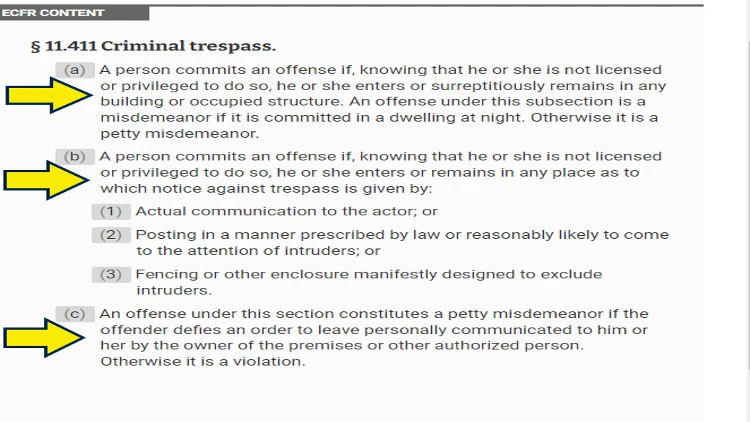
Criminal trespassing is not the same as criminal mischief charges, and have usually reduced penalties.
Criminal trespass can also take the shape of chopping down trees, hunting without permission on someone else’s property, or even messing with vending machines. It may also involve getting into or staying in a car without the owner’s consent.
One last form of trespass is civil trespass. This is where one unknowingly enters someone’s property or land without permission. It’s also known as Regular trespassing, where one enters or accesses someone else’s property without legitimate consent.
However, one may not be aware that they are on someone else’s property at the time of the act. This knowledge is crucial in defining the difference between civil or regular trespass and criminal trespass.
To summarize, criminal mischief occurs when a person damages property belonging to someone else. There are different degrees of criminal mischief charges depending on the extent of the damage.
The repercussions may involve a prison sentence, a fine, restitution, or a criminal record. Can criminal mischief charges be dropped, yes, using a full-proof defense in court, obtaining a reduced charge, or enrolling in a pre-trial diversion program.
Yes, if it’s a summary offense. Otherwise, you may just receive a probation sentence.
Yes, if it’s a second or first-degree criminal mischief charge.
The prosecution must prove that:
1Van Der Veen, H., et al. (August 29, 2019) What is the Charge of Disorderly Conduct in Pennsylvania? Van Der Veen, Hartshorn & Levin. Retrieved on October 10, 2022, From <https://www.mtvlaw.com/blog/2019/august/what-is-the-charge-of-disorderly-conduct-in-penn/>
2Hubbs, L. (February 25, 2021). What Is Criminal Mischief? HubbsLaw. Retrieved on October 10, 2022, From <https://www.hubbslawfirm.com/blog/2021/february/what-is-criminal-mischief-/>
3Reagan, K. (2021). Criminal Mischief PA. Reagan Law Firm. Retrieved on October 11, 2022, From <https://www.reganlawyer.com/blog/criminal-mischief-pa/>
4Cornell Law School – Legal Information Institute. (2022). 25 CFR § 11.410 – Criminal mischief. Criminal Mischief. Retrieved October 24, 2022, From <https://www.law.cornell.edu/cfr/text/25/11.410>
5Montana State Legislature. (2021). Criminal Mischief. Criminal Mischief. Retrieved October 24, 2022, From <https://leg.mt.gov/bills/mca/title_0450/chapter_0060/part_0010/section_0010/0450-0060-0010-0010.html>
6Pennsylvania General Assembly. (2022). Title 18. Consolidated Statutes. Retrieved October 24, 2022, From <https://llegis.state.pa.us/cfdocs/legis/LI/consCheck.cfm?txtType=HTM&ttl=18&div=0&chpt=33&sctn=4&subsctn=0>
7Washington State Legislature. (2011). Criminal Trespass in the Second Degree. RCW 9A.52.080. Retrieved October 24, 2022, From <https://app.leg.wa.gov/rcw/default.aspx?cite=9A.52.08>
We use cookies to ensure that we give you the best experience on our website. If you continue to use this site we will assume that you are happy with it